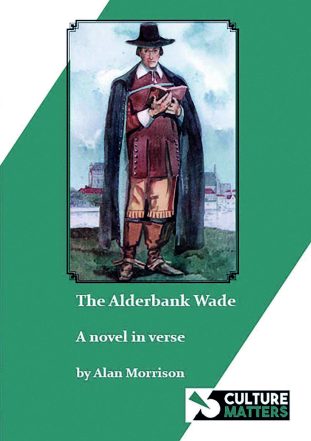
By John O’Donoghue
Alan Morrison is the author of twelve poetry collections, and founding editor of The Recusant and Militant Thistles webzines. His thirteenth book, The Alderbank Wade, comes out of Morrison’s fascination with the political and religious nuances surrounding the English Civil War/Revolution. Originally drafted as a novel in 1997, Morrison has now redrafted the story in rollicking, semi-rhyming couplets, in an historicised but broadly contemporary language, which evokes the plain speech of the Levellers:
When we were young & green as the April swards
We’d play in the Ladle Vale with sticks for swordsOr knock together quarterstaffs of logs from the wood
Pretending to be Little John fighting Robin Hood.
The ‘we’ here is Jared Amory, who relates the story, and his childhood friend, Gideon Wade:
We were both temperamental sons of austere men,
Gideon’s father a simple farmer & glass-eyed Anglican,Mine, a solicitor’s scrivener & ruminating ‘Puritan’
Who chewed his Geneva Bible under a shady capotain
A ‘capotain’ was the wide-brimmed hat worn by Puritans, and is an example of Morrison’s adroit use of 17th century terms to give verisimilitude to this long poem. The research is impeccable, as is the verse-craft. Something of the spirit that inspired the Roundheads is evoked in a description of Cromwell’s forces setting forth: [we’d] sing our soul-rousing hymns…//…lightening our load/ As we rode through gloom-plunged woods, joyously rode.’ On one of these sallies Amory learns that Wade had ‘distinguished himself &…been/ Captured by our side along with other Royalists/ Found maimed on the field in the musket mists.’’ That fine imagined detail – ‘musket mists’ – is an example of Morrison’s telling eye for detail.
As the civil war progresses, so does Amory. In 1646 Parliament triumphs and the King is imprisoned. Amory has been mainly engaged as a messenger and with the cessation of hostilities returns to his father’s ‘Ramshackle alms-cottage’ where he learns of a ‘rumoured revelation’: Wade, who had fought with the Royalists but later switched sides and become a Parliamentarian, sets about the desecration of churches:
… & so they tore down the reredos,
Smashed up statues & idols, demolishedThe altars, took axes to the wooden pulpits, slung
Out any popish gold…
But this violence to church property does not come without a psychological cost to Amory: ‘Was it not blasphemy/To smash up chapels in spite of trappings of popery?’ When Wade captures the Royalist redoubt, Alderbank House, he founds a ‘True’ Leveller community, the Alderbank Diggers, where Amory, also a Leveller convert, joins him as his secretary: ‘Then came Alderbank’s second/& transitional incarnation as a base under one/Captain Wade’s command’ . This period is characterised by ‘the fluid nature of// Of the fluxing times’ when ‘Baptist, Behmenist, Soul sleeper,/ Seeker, even Ranter’ all converge on Alderbank. Wade turns the place into a self-sufficient community, with crops under cultivation, and with farmland for ‘sheep & cows to graze’.
But the Old Faith is never far away, as when the fanatical Cart Arthur (nicknamed ‘Cathar’) ‘Suspicious of taciturn Dale, had rifled through his// Personal belongings & discovered… a small/ Wooden rosary…’. But Wade will not expel the recusant: ‘Gideon…/ Appeared unconcerned by Richard’s Catholicism…//…he believed in a Levelling of religion…//…a reunification of Christendom…’. As Alderbank progresses a manifesto is issued: ‘THE ALDERBANK DIGGERS…
INVITES EVERYMAN WHOSEVER BELIEVES IN OUR CAUSE
TO COME & TILL THE SOIL WITH US & SHARE THE FRUITSTHEREOF, WHERE WE MIGHT LIVE AS EQUALS
ACCORDING TO NATURAL RIGHTS; WHERE ALLARE WELCOME NO MATTER FAITH OR SOCIAL STATION
OR WHICHEVER SIDE OF THE WAR THEY FOUGHT ON
Morrison follows this with Wade’s trance-like vision of how Christ might look on His return: ‘Kindly but tinged with anguish, of indeterminate age…
Wide oval eyes of deep green & penetrating
Depth, brown shoulder-length hair touchingThe tops of His white lace collars, a countenance
Ironically not unlike the late King’s, but of essenceInfinitely wise & humilitous – His whole figure
Radiating a refulgent, sublime powder blue auraWhich in propinquity, touched one with euphoria…
This lyrical vision of Christ bears fruit in the community’s coming together: ‘As we sat round our table in Alderbank hall…
&, amid swirling mists of postprandial pipesmoke
Sang psalms & hymns that echoed round the oak-Panelled walls & beamed rafters as if we had set
Up a church spontaneous…
But this time of spiritual renewal and happiness is threatened by Cromwell’s clampdown on the Diggers and the Levellers, and Amory and Wade start to drift apart: ‘It pained me how far our souls/Had rolled apart like two ends of a scroll…’. Amory starts to doubt his former friend: ‘I had a divided mind at a divided time…’. It is now that the community starts to fragment: ‘Gideon immediately…
Summoned all members of our Digger community
& gave each man an option to down tools & depart
Alderbank before the oncoming siege would startOr take up sword & pistol to defend it against
Cromwell’s New Model Romans as he cursed them…
Tranter, on behalf of the government forces, issues a final warning to surrender Alderbank or face the consequences. The end when it comes is sudden: ‘Coming over the ridge…
& down towards Alderbank I was horrified to
See the House & grounds ablaze, lit up in infernoAgainst the darkening skies – screams & shouts hurled
Themselves through the smoke-thick night that smotheredThe senses & chocked the breaths – then came a deafening
Thud of what sounded like thunder, an explosion…
The barrels of gunpowder stored in the cellars under Alderbank have exploded. Amory is thrown from his horse and blacks out. The ‘experiment’ is at an end, and recriminations and rumours ensue about who had betrayed this attempt at utopianism. In a poignant envoi Amory looks back to the childhood he shared with Wade, and concludes: ‘…in the deepening shade/ Of this windmill I reflect on the choices we made// & whether we were not all the Alderbank Wade.’
Morrison is a fine poet and this moving narrative of an England at war with itself over ideas of religion and politics is a parable for our own divided times. We have come through the disaster that is Brexit, and now its chief apologist is threatening to obtain the keys to Number 10 Downing Street. As Reform seeks to further divide us, The Alderbank Wade becomes required reading for all who would seek to learn the lessons of history: a more perfect union of our fellow citizens is possible, but only through tolerance and charity, not through violence and division. The State that embodies these qualities is the inheritor of Alderbank’s golden moment.
The Alderbank Wade – a novel in verse by Alan Morrison, is available in print here and as an ebook here.















